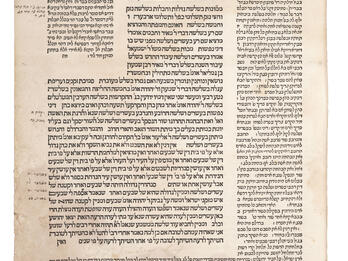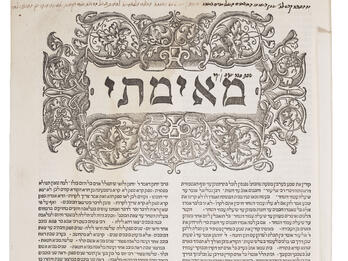Colophon: Pentateuch with Rashi and Other Commentaries
From the day that God confused all the languages of the land [see Genesis 11:9], through the bitter and rapid exile of the expulsion from Spain, since then all good things have ended for us; our glory, our splendor and our majesty have gone, for the Lord our God has destroyed us and devoured us and stunned us. He has pushed us from our place, and He has shaken us with a huge tumult [see Isaiah 22:17]. God has come from His place to take plunder and booty, and to exterminate every strong man and every man of valor, from our youth to our old men, to do away with our remnant and our children, and even our infants. God wanted to destroy us until nothing was left.
We two or three remaining crumbs [see Isaiah 17:6], in our time of distress we passed from nation to nation and from kingdom to kingdom, traveling back and forth. Shall we wholly perish? (Numbers 17:28). Books, too, have perished and been destroyed in the horrors of destruction and labyrinths of chaos, because the frequent troubles have left us an empty vessel and have swallowed us like a crocodile. They have devoured us and broken our bones and emptied our sacks, stripped us of our garments of glory and splendor. So much so, that as a result of the tribulations of the times and the shortage of books, men have become negligent in educating their sons, so that even if they have a Bible in their possession, no translation is available, and when a translation exists, there is no commentary. Thus, knowledge among the Jews has become like a widow; there is none to guide her or take her by the hand [see Isaiah 51:18]. The paths of the Torah are laid waste, and knowledge has become a wayfarer. Children asked for the bread of the Torah, but received no interpretation.
But now there has been some grace from God, to leave us a refuge. From the straits of our tribulations, He has brought forth remedies and cures for our pains and shown us miracles. The spirit of God has borne us one from a city and two from a family [see Jeremiah 3:14], these from the north and from the west, and these from the land of Sinim (Isaiah 49:12). He has brought us, the poor and the destitute, to the great city of Constantinople, a metropolis of the Jews. Among those who came, God called upon [see Exodus 35:30] two brothers, printers, namely his honor R. David ben Naḥmias and R. Samuel ben Naḥmias. God has given them wisdom and understanding to do the work [see Exodus 35:31] of printing with great perfection. They have taken the initiative to venture forth and promulgate the Torah among the Jews, to make a small change in what was cut off and lost whether by sea or by land, of the innumerable books.
With the mercy of God upon us, from the Land of Nod [see Genesis 4:16] these two printer brothers came to us, who, with strength and perseverance, and with the help of the blessed Creator, took up arms against the troubles of the time. They opened and engraved this book of the Torah, a candelabrum of pure gold, with seven candles on it, i.e., the Pentateuch, the Targum [Aramaic translation], Rashi’s commentary, the Haftarot [passages from the prophets read during Sabbath morning prayers], their interpretation by the sage R. David Kimḥi [France, 1160–1235] of blessed memory, the Five Scrolls, and the commentary by R. Abraham Ibn Ezra [Spain, 1089–1167] of blessed memory. It is a very worthy book, more beneficial than all other books that have been printed to this day.
God, who gives strength to the weary, brought to these printers two honorable businessmen, his honor R. Yeshua, may he rest in peace, son of his honor R. Saadia, may he rest in peace—who began the good deed, but time did not allow him to complete it, as he passed away—and his honor R. Isaac Caspota. Both of them supported these printers, each with their money and wealth, their possessions and property, may their work be acceptable before God, and may their righteousness sustain them forever and ever. For it is through them and their money that this great mitzvah was achieved. May their hands remain steadfast until its completion, with the help of the One Who spoke and the world came into being.
As for me, a young man, the lowly Abraham, son of my lord R. Joseph Ya‘ish of blessed memory, from the exile of Jerusalem that was in Spain [see Obadiah 1:20], they asked me about the letters, and the order and precision, and the proofreading. They asked me to see if there were errors in the work of their hands. And I, to the best of my ability, I pondered and inquired and corrected every error in the commentaries, and every distortion, to the extent that I was able and the nature of the work allowed. Although it is in the nature of the craft of printing that even one who toils over it will never be free of error, as its details are almost endless, nevertheless I proofread it with the utmost precision that the good hand of my God granted me [see Nehemiah 2:8]. However, the proofreading of the vowel signs was given to a man expert in the work, since I am not a master of that craft. His name is Abraham de Paredes, an erudite man who knows the work of inserting vowels, and is renowned among us for his efforts to do with utmost precision the task assigned to him, as well as he can. His eye did not fade, and its vigor did not depart [see Deuteronomy 34:7]. Therefore, the man who desires life, and loves many days, that he may see good (Psalms 34:12) will not abandon this book, as it is absolutely perfect, better than all the books that have been printed these past many years.
All the work was completed in the month of Nisan in the year 5265 to the creation [1505] in the great city of Constantinople, which under the rule of the great king, our lord his majesty Sultan Bayezid, may his glory be exalted in his days and in our days may Judea and Israel be redeemed and dwell in security. Amen, may it be His will.
The words of the young Abraham, son of my lord R. Joseph ben Ya‘ish, may he be remembered for eternal life.
Translated by
.
Credits
Abraham ibn Ya’ish, “Colophon,” in Pentateuch with Commentaries by Rashi and Others (Constantinople, 1505).
Published in: The Posen Library of Jewish Culture and Civilization, vol. 5.




